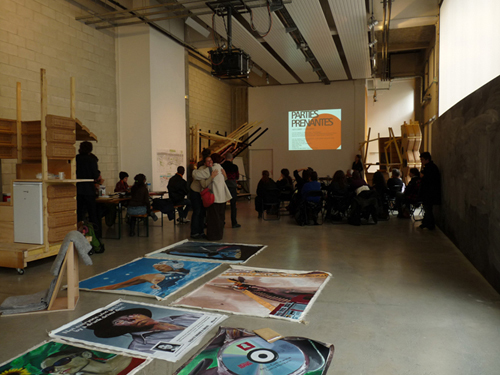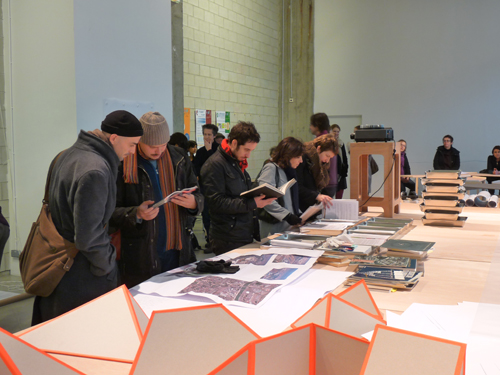Parties Prenantes

- Parties Prenantes 1, presentation, Bétonsalon - Center for Art and Research, Paris, 2009
Arte de Conducta, La Havana, Cuba - Tania Bruguera
Art and Social Practice, Portland, USA - Jennifer Delos Reyes & Harrell Fletcher
Ecole des Arts Politiques, Sciences Po Paris - Bruno Latour & Valérie Pihet
with students and teachers from:
Université Paris Diderot - Paris 7
ENSA Paris-Val de Seine
Ecole Publique de Paris, Bétonsalon
ENSA Paris Cergy
ENSBA Paris
La Forme des Idées (ENBA Lyon & ENSA Nice)...
A proposal of Mélanie Bouteloup (Bétonsalon), Julien Lanchet & Sara Martinetti (students at Université Paris Diderot - Paris 7)
Parties Prenantes (Interested Parties) are the actors (individual or collective) who are concerned by a project; they weave networks of relations based on their mutual interdependence. A student, a teacher, university staff, an artist, an inhabitant, a child, a passer-by, a shopkeeper, an employee or a non-profit organization could constitute one possible flowchart of the district ZAC Massena Paris Rive Gauche (‘Concerted Building Zone’, 13th arrondissement). The exhibition project Parties Prenantes invites these actors to join and intertwine their reading of the context, thus creating a more complex representation of this urbanistic space. This concept of representation - to be understood as rendering processes visible through signs, images, texts, or maps - will be approached by linking fields that are often disconnected, such as the sciences, politics and art.
How can an art center articulate, within a project, research, creation, and pedagogy with the characteristics of the context? What role can representation play in the understanding and the transformation of a neighbourhood? How to create a project that can “be participated”, which is notionally a space of interpretation? These are all questions that the participants of Parties Prenantes will reflect upon, by developing such forms and practices as they deem appropriate, arising from agreement, compromise or conflict.
Parties Prenantes is a project about collective practices of production and knowledge transmission, using the models of pedagogy and orality. Bétonsalon invites schools to engage, train, develop different projects with the district users. Their specificity is to develop a contextualized artistic practice, less centered on the production of objects than on the process of collaboration. The “Cátedra Arte de Conducta” is a school dedicated to the study of performative behaviour and political art, founded in La Havana (Cuba) by the artist Tania Bruguera. It questions the limits of the artistic field in historical and ideological conditions and proposes the implementation of the social usefulness of art. “Art and Social Practice” is a Master’s programme at Portland State University (Oregon, USA), founded by artist Harrell Fletcher. It encourages students to develop their artistic practice within society, by using methods from sociology, anthropology and journalism. The “School of Political Arts” of Sciences Po, founded by Bruno Latour (opening scheduled for September 2010), will converge social sciences, humanities and arts in an innovative set of teaching and learning experiences focused on a common object, the public space. The University Paris Diderot - Paris 7, the Paris-Val de Seine architecture school, the Public School of Paris, the Paris Cergy (ENSA) and Paris (ENSBA) schools of Fine Arts, ‘La Forme des Idées’ (ENBA Lyon and ENSA Nice) will also work with the interested parties of the district.
Mélanie Bouteloup, Julien Lanchet, Sara Martinetti.

- Parties Prenantes 3, Bétonsalon - Center for Art and Research, Paris, 2010
Format
Parties Prenantes is an exhibition open to the public that presents itself in different forms: workshops, lectures, debates, picnics, a radio, a library, a catalog ... The space of Bétonsalon is transformed into a working space : maps of the area, tables, computers, cafeteria and a library.
As part of the reconsideration of traditional forms of presentation (conducted over especially during the last ten years by many artists, followed by curators and directors of the institution), the exhibition takes multiple forms not necessarily linked to the presentation of works of art. For instance, we can quote exhibitions “Places with a past” and “Culture in action” organized by Mary Jane Jacob in 1991 and in 1992-1993 in Chicago, in which the invited artists were introduced into communities to work on social projects. In Paris, the experience of “Société Anonyme” exhibition in Plateau / Frac Ile-de-France in 2008, where artists, collectives and structures from different cities of the world, temporalily relocated their activities in Paris to think up new projects in collaboration with artists, scientists, or intellectuals from Paris. A program of public events (in the form of lectures, screenings, activities, performances, seminars, workshops, dinners, concerts, parties, etc..) then allowed to follow the progress of their work. These exhibitions have in common to consider the role of the curator as the one that invites artists or collectives to work from a background in direct collaboration with the resources available in order to develop tools for critical thinking and action in this world.
Each residency will begin with a series of ‘meeting days’ in order to introduce participants and artists to one another, and to present issues related to the context through lectures, guided tours and debates. Each project, collectively determined, might take on various forms of existence: objects, photographs, videos, radio broadcasts, actions, classes, enquiries... The production process and the works produced will be exhibited in Bétonsalon’s space, then documented in a catalogue to be published after the project.
Students, teachers, university staffs, artists, inhabitants, children, passers-by, shopkeepers, employees are invited to participate in ‘Parties Prenantes’. Interested people need to come to the meeting days.
Participation can take three different forms :
– A core group will be constituted by a students from the different schools.
– Small groups will participate for a day or an afternoon, in order to do a workshop or a class.
– Visitors will interact when they enter the space
Download the press release (only in French)
Share